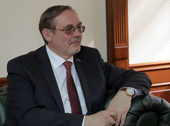
The fate of Karasin-Abashidze talks unknown as the Russian deputy foreign minister leaves his position
By Levan Abramishvili
Tuesday, July 30
Russian Deputy Foreign Minister Grigory Karasin, who is the main negotiator with Georgia from the Russian side, is leaving his position, Russian ‘Kommersant’ reports. After the 2008 war and subsequent occupation of Georgia’s regions, Karasin has represented Russia in the Geneva International Discussions (GID).
On August 23, Karasin turns 70. According to Russian law, he can only be in the office before he reaches the age. Karasin started his diplomatic career in 1972, holding various positions both under the USSR and Russian Federation afterward. Before becoming the Deputy Minister of Foreign Affairs in 2005, he served as the Ambassador of Russia to the United Kingdom from March 2000 to June 2005.
‘Kommersant’ reports that “the Ministry of Foreign Affairs has practically decided who will become Deputy Minister in place of Grigory Karasin, who is up for a seat in the Federation Council.”
Even though there are at least three people being considered for the high-ranking position, the current head of the Consular Department of the Ministry Ivan Volynkin seems to be the apparent leader, according to ‘Kommersant’.
Volynkin served as the envoy extraordinary and plenipotentiary of the Russian embassy to Georgia until, in 2007, The Georgian Foreign Ministry declared several Russian diplomats in persona non grata and made them to leave the country, including Volynkin.
Then-President Mikheil Saakashvili said at the time that the diplomats were engaged in “subversive activities” against Georgia.
Volynkin served in the USSR and Russian Foreign Ministries. Aside from Georgia, he has worked in Yugoslavia, the US, Serbia, Montenegro, and Macedonia. From 2013 to 2017 he served as the Russian Ambassador to Armenia.
A Special Representative of the Prime Minister of Georgia on Relations with Russia Zurab Abashidze said that he learned about Karasin’s resignation through the media, as the Georgian Government hasn’t received any information from the Russian side. Therefore, Abashidze didn’t comment on the future of his talks with Karasin, or who will replace him in the GID.
“Media outlets spread this information, and we learned about the possible replacement for Karasin’s position. We have not received any official information from the Ministry of Foreign Affairs. As soon as we have the official information, we will make an appropriate statement,” said Abashidze.
At the Russian Foreign Ministry, Karasin oversees issues of bilateral relations with the CIS countries and works with representatives from abroad. He is also responsible for interactions with the chambers of the Federal Assembly, the Russian Orthodox Church and public organizations. Directions which Karasin is responsible for are considered some of the most important, as well as problematic for the Russian foreign policy since they include the conflict in Ukraine, Georgia, and Nagorno-Karabakh. These directions are specific, as the decisions regarding these issues are taken not at the Ministry, but in the Kremlin.
The Abashidze-Karasin format was initiated at the end of 2012 by the former Prime Minister and the founder of the ruling party, Georgian Dream, Bidzina Ivanishvili to solve economic and transport issues between Russia and Georgia. As opposed to the GID, the Abashidze-Karasin talks address issues related to trade, economic, humanitarian, and cultural aspects of the Russian-Georgian relationship.
GID, which focuses on political issues, was launched in Geneva, Switzerland, on October 2008, in the aftermath of the Russo-Georgian war, it is co-chaired by the OSCE, the EU, and the UN. The Geneva process brings together representatives of the participants of the conflict—Georgia, Russia, and Georgia’s occupation regimes from Abkhazia and South Ossetia, as well as the United States.


